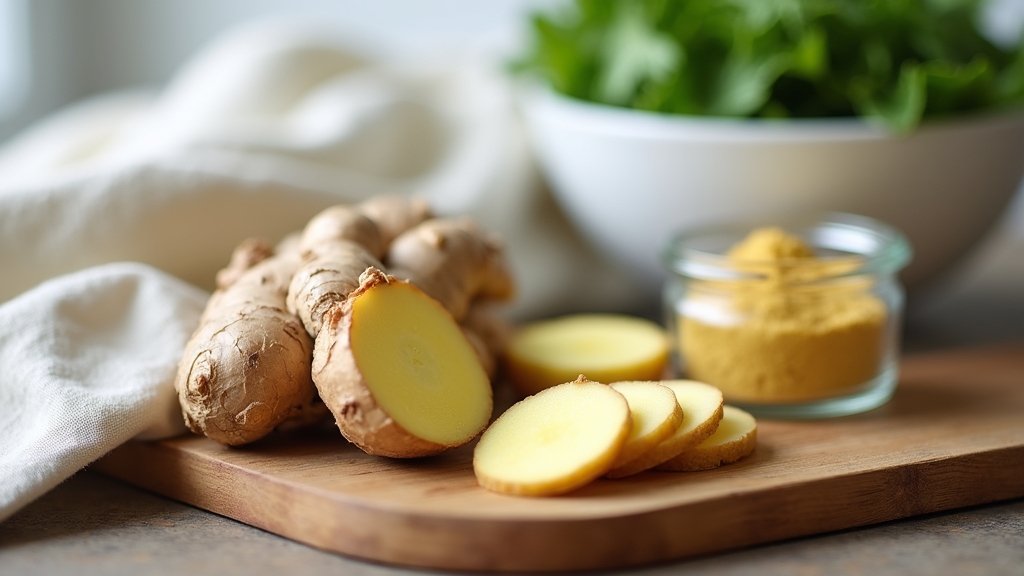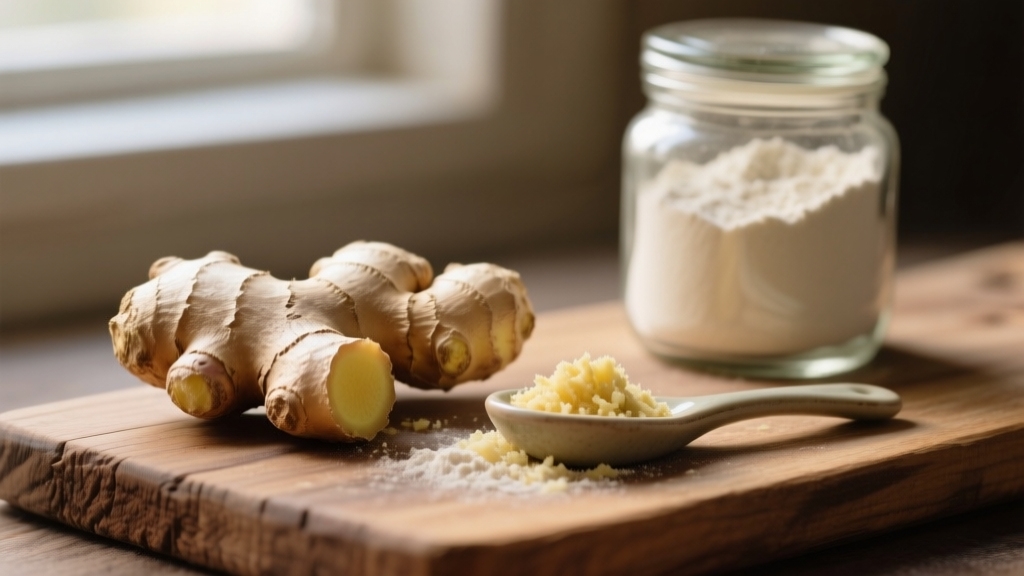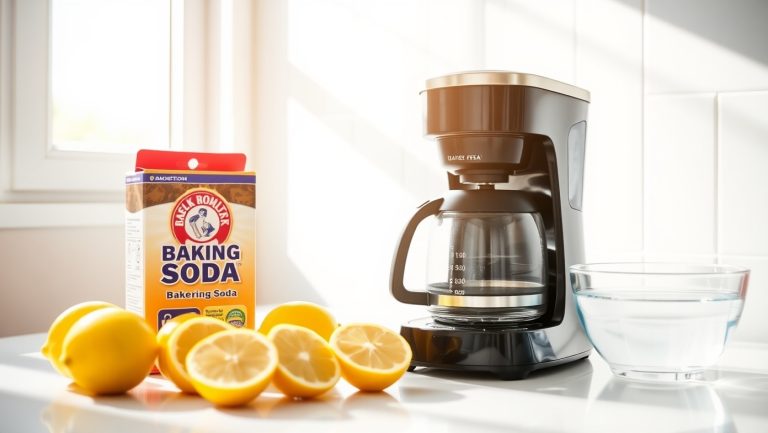Does Ginger Contain Gluten? The Truth About This Spicy Root
You’ll be glad to know ginger is naturally gluten-free, whether fresh or ground. It contains no gluten proteins since it’s a root, not a grain. However, cross-contamination can happen if processed near gluten-containing products, so choosing certified gluten-free ginger is wise.
Ginger also offers benefits that may help soothe gluten-related gut inflammation and support digestive health.
If you want to understand how ginger interacts with gluten sensitivity and food safety, there’s more useful information ahead.
Key Takeaways
- Ginger is a root vegetable that naturally contains no gluten proteins or peptides.
- Fresh and pure ginger is inherently gluten-free and safe for gluten-sensitive individuals.
- Cross-contamination may occur if ginger is processed or stored with gluten-containing products.
- Certified gluten-free ginger products minimize risks of gluten contamination.
- Ginger’s gluten-free status remains intact in dried or powdered forms if properly processed.
Gluten Content in Fresh and Ground Ginger
Although gluten is a protein found in certain grains like wheat, barley, and rye, fresh and ground ginger contain none of it.
Fresh and ground ginger contain no gluten, making them safe for gluten-free diets.
You can confidently use fresh ginger in gluten-free dishes, as it naturally lacks gluten and won’t trigger any gluten-related issues. Its antioxidant and anti-inflammatory properties make it a healthy addition to your diet, especially if you have gluten intolerance. Additionally, maintaining cold temperatures during food preparation helps preserve the integrity of sensitive ingredients like ginger.
Ground ginger, similarly, is gluten-free and frequently used in baking to enhance flavor without adding gluten.
Both forms retain beneficial bioactive compounds like gingerol, supporting digestion and reducing inflammation.
Ginger also exhibits immune-enhancing effects, which can be particularly beneficial for individuals managing gluten sensitivity.
Whether you choose fresh or ground ginger, you’ll enjoy their health benefits without worrying about gluten contamination from the ginger itself. Proper storage in airtight containers can help maintain its potency and freshness.
This makes ginger a safe, versatile choice for gluten-sensitive individuals.
Cross-Contamination Risks in Processed Ginger Products
Fresh and ground ginger naturally contain no gluten, making them safe choices for gluten-sensitive individuals. However, processed ginger products may pose cross-contamination risks if not handled properly.
Contamination often occurs in facilities processing both gluten-free and gluten-containing items, especially when equipment isn’t adequately cleaned or production lines aren’t separated.
To minimize your risk, consider these key factors:
- Choose products with gluten-free certification, ensuring adherence to strict manufacturing and testing protocols.
- Avoid bulk or unpackaged ginger items, as they’re more prone to contamination.
- Check labels carefully, especially on processed ginger products like ginger supplements, which may contain gluten or be processed in shared facilities.
Regularly cleaning utensils and surfaces is crucial to prevent cross-contamination and maintain kitchen safety.
Ginger’s Role in Managing Gluten Sensitivity and Allergies

When managing gluten sensitivity and allergies, you can turn to ginger for its notable anti-inflammatory and gut-supportive properties.
Ginger’s bioactive compounds reduce intestinal inflammation by lowering inflammatory cytokines and modulating excess nitric oxide production. This helps ease gluten-induced gut distress and supports overall gut functionality.
Additionally, ginger positively influences gut microbiota, enhancing beneficial bacteria that strengthen gut barrier integrity. This is vital for those sensitive to gluten.
This microbiome modulation supports immune regulation, limiting abnormal reactions to gluten proteins.
Since pure ginger is naturally gluten-free, you can safely include it in your gluten-free diet to harness its antioxidant, anti-inflammatory, and gastrointestinal benefits. However, it is important to ensure that any processed ginger products are free from gluten contamination to avoid adverse effects from hidden gluten sources processed ginger.
Regular ginger intake may alleviate common symptoms such as bloating, cramping, and nausea. This can help improve your quality of life while managing gluten-related disorders.
Use of Ginger in Gluten-Containing Baked Goods
When you use ginger powder in gluten-containing bread, it mainly boosts the flavor without messing with the dough’s structure. It’s a great way to add a little zing! The flavor distribution in baked goods can be enhanced by carefully balancing ingredients like ginger.
But there’s something important to keep in mind: cross-contamination risks. If ginger is processed or stored near gluten-free products, it can pick up some unwanted gluten. For gluten free baking, it’s essential to use ginger powder from a reliable source to avoid contamination and ensure the recipe really works.
Ginger Powder in Bread
Although ginger powder is commonly celebrated for its distinctive flavor, its incorporation into gluten-containing bread dough also influences dough texture and baking outcomes in measurable ways.
Adding about 1% ground ginger slightly reduces dough hardness and chewiness, improving texture without hindering gluten development. This makes it easy for you to adapt recipes without altering mixing or proofing times. For example, using gluten-free flour blends with xanthan gum can achieve a similar tender crumb and texture when adapting recipes for gluten intolerance gluten-free flour blends.
Additionally, ginger imparts a yellower, darker color due to natural pigments and Maillard reactions.
Importantly, it also reduces acrylamide formation by approximately 6.2%, offering potential health benefits beyond flavor.
Key effects of ginger powder in bread include:
- Texture softening and improved chewiness at low concentrations
- Noticeable color changes linked to pigment and chemical reactions
- Significant reduction of acrylamide, a harmful baking byproduct
Cross-Contamination Risks
Ginger’s naturally gluten-free nature makes it a safe ingredient on its own, but you need to be cautious about cross-contamination risks when using ginger in gluten-containing baked goods.
When ginger is incorporated into products like cookies or cakes made with wheat flour, the gluten presence comes from the flour, not the ginger. Proper handling and safe food preparation practices are essential to prevent gluten exposure.
However, if you prepare gluten-free ginger items in the same kitchen or with shared utensils as gluten-containing baked goods, cross-contact can occur. Using gluten-free flour blends specifically designed to avoid cross-contamination is essential in such scenarios.
To minimize risks, use dedicated equipment and separate prep areas. Also, source ginger and other ingredients from certified gluten-free suppliers, and store them properly.
Always check labels for gluten warnings and opt for products with gluten-free certification to ensure safety for those with celiac disease or gluten sensitivity.
Effects of Ginger on Intestinal Health and Inflammation
Did you know that ginger can really have a positive impact on your gut health? It’s fascinating! Research indicates that ginger helps to modulate gut microbiota, which plays a big role in inflammation and how well our intestinal barrier functions.
What’s even more interesting is that ginger actually increases the levels of beneficial bacteria in our gut. These good guys are linked to reduced inflammation and better mucosal integrity. Additionally, ginger constituents such as gingerols and shogaols are rapidly absorbed in the small intestine, contributing to their beneficial effects.
Ginger’s Impact on Gut
Consider these effects of ginger on your gut:
- It enhances gut microbial diversity and stability, promoting a resilient microbiome. Proper nutrition and digestive health tools can complement these effects.
- Ginger stimulates digestive functions by improving gastrointestinal motility and enzyme secretion.
- Bioactive compounds in ginger, including exosome-like nanoparticles, interact with beneficial bacteria, potentially modulating microbial metabolism. However, clinical studies indicate that ginger supplementation induces only limited microbiome changes, affecting specific bacterial taxa rather than broad community shifts.
Inflammation and Mucosal Barrier
Although ginger contains compounds that can aggravate intestinal inflammation by increasing mast cell activity and reducing mucus barrier thickness, it also includes bioactive substances that support mucosal integrity and reduce inflammation. These bioactive substances can be incorporated into various customization options for health-focused dietary plans.
You should know ginger’s furanodienone activates pregnane X receptor (PXR), preserving epithelial integrity and lowering systemic inflammation. Additionally, ginger’s 6-shogaol and 10-gingerol inhibit NF-kβ pathways, decreasing pro-inflammatory cytokines like TNF-α and IL-6.
Ginger also promotes mucosal prostaglandin E2 synthesis, supporting mucosal protection without harming COX-1 enzymes. Its antioxidant properties reduce oxidative stress, enhancing mucosal defense. Moreover, ginger extract has been shown to improve gut microbiota diversity, restoring the imbalance caused by colitis and increasing beneficial bacteria such as Lactobacillus murinus gut microbiota diversity.
However, ginger can inhibit goblet cell regeneration, weakening the mucus barrier and potentially increasing lipopolysaccharide infiltration. Therefore, ginger’s effects on inflammation and mucosal barrier function depend on the specific compounds involved and physiological context, requiring careful consideration when using ginger for intestinal health.
Chemical Properties of Ginger Relevant to Food Safety
Since ginger is a root vegetable rather than a grain, it inherently contains no gluten, making it safe for individuals with gluten sensitivities.
Ginger, a root vegetable, naturally contains no gluten, ensuring safety for those with gluten sensitivities.
Its chemical composition includes over 400 bioactive compounds, such as gingerols, shogaols, and volatile oils, which contribute to its flavor and health benefits without introducing gluten peptides.
However, food safety depends on factors beyond intrinsic chemistry.
Consider these key points about ginger’s chemical properties and safety:
- Ginger contains enzymes like zingibain and antioxidants that support food safety by reducing microbial growth and oxidative damage. Its natural antimicrobial properties align with those found in wood cutting boards, which help reduce harmful bacteria.
- Contaminants such as mycotoxins (e.g., aflatoxin B1) can occur from improper storage but aren’t related to gluten content.
- Cross-contamination risk exists if processing equipment handles gluten grains, so sourcing certified gluten-free ginger is advisable. Additionally, the global production of ginger is led by India, highlighting the importance of supply chain vigilance to maintain gluten-free standards.
Clinical Evidence on Ginger’s Safety for Gluten-Sensitive Individuals
How does ginger affect those with gluten sensitivity? Clinical evidence indicates that ginger doesn’t contain gluten or trigger gluten-like immune responses. Dehydrated ginger retains these properties when dried evenly, which is important since uneven drying can affect the potency of active compounds due to heat circulation.
Animal studies reveal ginger’s potential to reduce inflammatory cytokines such as IL-4 and decrease bacterial growth associated with gluten-induced gut inflammation.
These findings suggest ginger might alleviate gluten sensitivity symptoms by modulating immune and inflammatory responses. Additionally, ginger’s anti-inflammatory properties and antioxidant effects may help reduce oxidative stress linked to gluten-related gut damage.
However, some research also shows ginger could worsen intestinal inflammation in specific contexts by impacting gut barrier function.
Importantly, no human trials confirm these effects in gluten-sensitive individuals.
You should choose pure ginger products verified gluten-free to avoid cross-contamination risks, especially from processed supplements.
Frequently Asked Questions
Can Ginger Help Improve Digestion in People Without Gluten Sensitivity?
Yes, ginger can help improve your digestion even if you don’t have gluten sensitivity. It speeds up gastric emptying and stimulates digestive juices, which aids food breakdown and reduces discomfort.
Ginger’s anti-inflammatory properties soothe your digestive tract, easing symptoms like bloating and nausea. Regular intake may regulate stomach contractions and support overall gut health, making it a beneficial natural option to enhance your digestive function.
What Are Common Culinary Uses of Ginger Outside Gluten-Containing Foods?
You probably never guessed ginger’s role extends far beyond gluten-packed treats.
In fact, you’ll find it spicing up Asian stir-fries, Indian curries, and Korean barbecue, adding zest to sauces, marinades, and soups.
It brightens drinks like masala chai and ginger ale and even cleanses your palate with pickled slices in sushi.
How Should Ginger Supplements Be Stored to Maintain Potency?
You should store ginger supplements in airtight containers to prevent oxidation and maintain their potency.
Keep them at room temperature or cooler, around 21°C, and avoid humid environments to prevent moisture absorption.
Use opaque containers to protect them from light damage, and guarantee the containers are tightly sealed to minimize air exposure.
Following these steps will help preserve the supplements’ effectiveness and extend their shelf life.
Are There Any Known Allergic Reactions Specifically Caused by Ginger?
Yes, ginger can cause allergic reactions like skin rashes, itching, swelling, and gastrointestinal upset such as nausea or cramps.
You might also experience respiratory symptoms like wheezing or throat swelling.
In rare cases, severe reactions like anaphylaxis can occur.
If you suspect an allergy, consult a healthcare provider for proper testing and management.
Abstaining from ginger and related spices is essential to prevent symptoms and ensure your safety.
What Distinguishes Organic Ginger From Conventionally Grown Ginger?
Sure, organic ginger isn’t just ginger with a fancy label.
It’s grown without synthetic pesticides or chemical fertilizers, unlike conventional ginger, which often gets a chemical spa treatment.
You’ll find organic ginger boasts higher antioxidants and essential minerals, thanks to natural soil care.
Plus, it’s free from pesticide residues, meaning less risk for you and the environment.
Choosing organic means supporting healthier soil, cleaner water, and happier pollinators.
Stay Confident with Ginger in Your Gluten-Free Lifestyle
You can trust that fresh and ground ginger naturally contain no gluten, but you should watch for cross-contamination in processed products. You can use ginger confidently to support gluten sensitivity and inflammation without worry.
You should remain cautious when ginger appears in gluten-containing baked goods, yet you can rely on clinical evidence confirming ginger’s safety for most gluten-sensitive individuals. You can enjoy ginger knowing it’s both beneficial and safe when handled properly.







